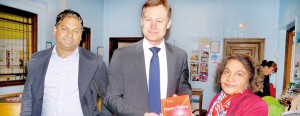Living and telling the story of China’s cultural revolution to a new generation
Rupa Monerawela was a story teller before she was a writer. Her grandchildren would clamour for tales about the kabaragoya their grandmother had as a child – and thrill to hear how it would roam around the house and pounce on meals of rice left out for it. Rupa’s childhood memories are also of listening to stories. In an email to the Sunday Times, the author writes: “We had a big dining table where everything was discussed and my father who did the first topographical survey of the Galoya valley in the 1940s encouraged us to listen to his adventures in the jungle and stories of our kings and the colonial period. We, the family had unknowingly inherited the desire to be adventurous and unconventional in our attitude to life.”

Rupa Monerawela, presenting a copy of her historical novel ‘The Bridge of Perfect Wisdom’ to Matthew Offered, MP for Hendon, recently while her son looks on
This attitude would be put to the test when, two weeks after they were married, she and her husband Chandra Monerawela left Colombo for China. There, Chandra was to take up his first posting as a member of the Sri Lankan Foreign Service. The year was 1965. It wasn’t a glamorous posting says Rupa but she chose to make the most out of the experience. “I knew very little of China at that time and everything I saw and experienced registered in my mind with great fascination. Sri Lanka had very good relations with China and this allowed me to feed my curiosity by visiting many places without rousing suspicion.”
They made many friends among Chinese from varied backgrounds – at formal parties they met Cambodians, Yugoslavs, British and Indian delegations, as well as members of local diplomatic community. Out on the streets, Rupa encountered locals, some of whom were members of the Red Guard. As young as 12 years old, they were all dressed in olive green cotton uniforms. Around their arms they had a distinctive red band and carried a red book.
Rupa jotted down all these impressions in a diary, which would eventually become the primary source of her first novel: The Bridge of Perfect Wisdom. The book tells the story of Liang Feng, a young Chinese woman of mixed parentage. An idealist and dreamer, Liang Feng, is moved by the philosophy and poetry of Chairman Mao. Her complete conviction in ‘Democratic Communism’ means Liang is soon identified as a ‘safe person’ by the authorities. Trusted to liaise with foreigners, her new job brings her into the company of two very different men – Donald Brown, the British attaché in Peking, and Pierre Devon, a French artist who lectures in ‘Environmental Studies’ at the Xin Hua University.
These encounters introduce her to new ideas, even as she begins to question the extreme measures embraced by the authorities in the throes of the Cultural Revolution. Rupa drew on her own experience and her years in China to supply both the minutiae of life in Peking at the time and the grand philosophical and political choices its people struggled with. In writing, as in thinking, she tried to maintain a sense of balance. For instance, though she herself did not feel threatened and was sometimes moved to pity by the state of the sick Red Guards she encountered in the hospital she used, she was aware the locals perceived them differently. “The Older Chinese dreaded them as they had no family ties in Peking and resorted to violent behaviour towards their own people. They had come from all parts of China trying to emulate the spirit of the 1949 long marchers,” says Rupa.
When writing ‘The Bridge of Perfect Wisdom,’ she felt it critical that she present a balanced take on Chairman Mao. “Chairman Mao laid the foundation for the modern period of China. Women had equality under communism unlike in feudal times. Historians are often one sided, here I acknowledge the good and bad period when Mao was too old and let a ‘Gang of Four’ run the Red Guard movement,” says Rupa adding that she only read about the many victims of the brutal labour camps after she had left the country.
It was an exciting time to be in China – not only did they get to see the Cultural Revolution from Ground Zero but they were there when the British Mission in Beijing was burnt down in August 1967 and the mission nurse came to them for help. “I remember the night the British embassy was set on fire our friend Noeline Smyth came in desperation knocking on our door to help her from the mob running riot. Without any hesitation we gave refuge in our flat breaking diplomatic rules of not first informing the ambassador and the foreign office. We could have jeopardised our special relations with China.”
Over the three years they stayed there, Rupa says she watched the Red Guards rise and then saw their popularity sour. She and Chandra gathered as much information about the state of the country’s politics as they could – translating everything from newspapers to posters to leaflets thrown from vans. All this detail has enriched the novel. Having taught history in the UK (where her husband served as Sri Lanka’s High Commissioner), Rupa knows that converting it into fiction, complete with relatable characters, is one of the best ways to excite the interest of the young readers she wants to engage.
Saying friends who’ve read the book think she should make it into a movie, like the Ben Affleck thriller Argo, she says: “My aim is to promote the book among the new generation of Chinese who are interested in reading English novels and specially a story that happened in their own country. They should know how their parents and grandparents went through a period of suffering.”



